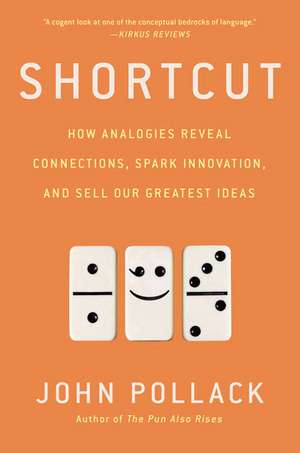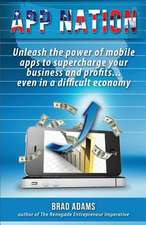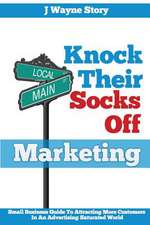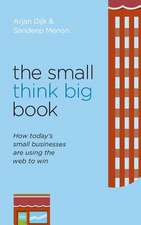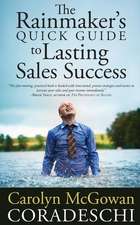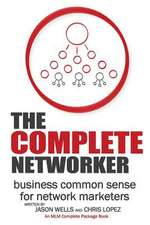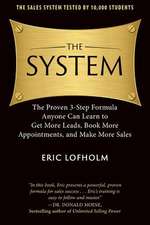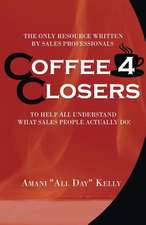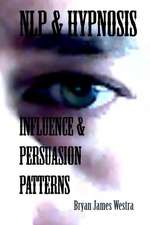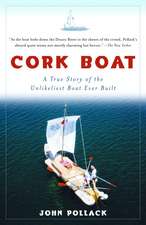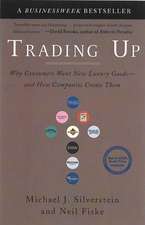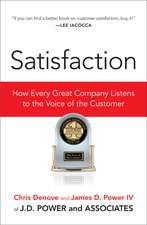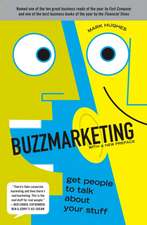Shortcut: How Analogies Reveal Connections, Spark Innovation, and Sell Our Greatest Ideas
Autor John Pollacken Limba Engleză Paperback – 29 sep 2015
Preț: 83.20 lei
Preț vechi: 91.56 lei
-9% Nou
Puncte Express: 125
Preț estimativ în valută:
15.92€ • 16.59$ • 13.18£
15.92€ • 16.59$ • 13.18£
Carte disponibilă
Livrare economică 14-25 martie
Livrare express 26 februarie-04 martie pentru 28.48 lei
Preluare comenzi: 021 569.72.76
Specificații
ISBN-13: 9781592409471
ISBN-10: 1592409474
Pagini: 256
Dimensiuni: 140 x 210 x 18 mm
Greutate: 0.25 kg
Editura: Penguin Random House Group
Colecția Avery
Locul publicării:New York, United States
ISBN-10: 1592409474
Pagini: 256
Dimensiuni: 140 x 210 x 18 mm
Greutate: 0.25 kg
Editura: Penguin Random House Group
Colecția Avery
Locul publicării:New York, United States
Recenzii
Praise for "Shortcut"
"John Pollack is the William Safire of his generation. In "Shortcut," he blends his encyclopedic knowledge, hard-earned experience in politics, and deep love of words to craft a book that consistently rewards the reader with keen insights into the wonders of how language shapes our thinking."
--Jake Siewert, global head of communications for Goldman Sachs
"As a historian, I have been professionally trained "not" to use analogies. But as John Pollack demonstrates in this eye-opening, mind-blowing, puzzle-solving book, comparisons and analogies infuse our thinking, infect our decisions, and inflect our efforts at persuasion. Once you lower your guard to Pollack's clever forays, you will never undervalue the power of analogical reasoning again--or ignore the risks of using comparisons too sloppily."
--Jack Rakove, professor of history and political science at Stanford University, winner of the Pulitzer Prize
"In the battle for public opinion, the best analogy usually wins. "Shortcut "shows us how--and why. It makes you think before you speak, literally. This is a great book, particularly for people who care about communicating effectively."
--Loretta Ucelli, White House Communications Director for President Bill Clinton
"Like a hot knife through warm butter, Pollack's clean prose cuts to the heart of the matter: We communicate, think, learn, and discover through analogies. Filled with captivating and entertaining examples, from falling apples to toppling dominos, the book teaches us how to best use analogies to win hearts, convince minds, and just have fun. Sure to float your boat."
--Scott Page, director of the Center for the Study of Complex Systems at the University of Michigan
"Pollack takes us on a fascinating journey through the shortcuts of the mind, revealing the immense power of analogy as a psychological device affecting our lives in intricate ways."
--Daniela Schiller, PhD, neuroscientist at Mt. Sinai School of Medicine
"Our minds work like supercomputers, processing impossibly vast amounts of information, creating patterns and parallels to make sense of all the data. "Shortcut" reveals how, through analogies (like the one in the previous sentence!), we understand our world, and, ultimately, ourselves. A fascinating read."
--David Zweig, author of "Invisibles: The Power of Anonymous Work in an Age of Relentless Self-Promotion"
"Pollack offers up an unparalleled feast of analogies, digging deep into his extensive experience as a writer to show why analogy is important, how it's constructed, and what makes it effective. "Shortcut" is to analogies what "The Joy of Cooking" is to brisket."
--Benjamin Bergen, director of the Language and Cognition Lab at the University of California at San Diego and author of "Louder Than Words"
"Anyone who has ever tried to find the right analogy to win an argument, to settle a dispute, to persuade squabblers to compromise--or who wants to avoid making things worse by using the wrong analogy--should read this insightful book!"
--Suzanne R. Butler, PhD, JD, member of National Academy of Arbitrators
Praise for John Pollack's books:
"He tells us, with a clarity unusual for the subject, how the mind works."
--"The New York Times"
"The best books on language are the ones that encourage us to reexamine what we think we know, and "The Pun Also Rises . . . "does exactly that."
--"The Boston Globe"
"Pollack's . . . quest seems not merely charming but heroic."
--"The New Yorker"
"Written in a style of singular grace and impact."
--"Washington Times"
"John Pollack is the William Safire of his generation. In "Shortcut," he blends his encyclopedic knowledge, hard earned experience in politics, and deep love of words to craft a book that consistently rewards the reader with keen insights into the wonders of how language shapes our thinking."
--Jake Siewert, Global Head of Communications for Goldman Sachs
"As a historian, I have been professionally trained not to use analogies. But as John Pollack demonstrates in this eye-opening, mind-blowing, puzzle-solving book, comparisons and analogies infuse our thinking, infect our decisions, and inflect our efforts at persuasion. Once you lower your guard to Pollack's clever forays, you will never undervalue the power of analogical reasoning again--or ignore the risks of using comparisons too sloppily."
--Jack Rakove, Professor of History and Political Science at Stanford University, Winner of the Pulitzer Prize
"In the battle for public opinion, the best analogy usually wins. "Shortcut "shows us how--and why. It makes you think before you speak, literally. This is a great book, particularly for people who care about communicating effectively."
--Loretta Ucelli, White House Communications Director for President Bill Clinton
"Like a hot knife through warm butter, Pollack's clean prose cuts to the heart of the matter: we communicate, think, learn, and discover through analogies. Filled with captivating and entertaining examples, from falling apples to toppling dominos, the book teaches us how to best use analogies to win hearts, convince minds, and just have fun. Sure to float your boat."
--Scott Page, Director of the Center for Study of Complex Systems at the University of Michigan
"Pollack takes us on a fascinating journey through the shortcuts of the mind, revealing the immense power of analogy as a psychological device affecting our lives in intricate ways."
--Daniela Schiller, Ph.D., Neuroscientist at Mt. Sinai School of Medicine
"Our minds work like supercomputers, processing impossibly vast amounts of information, creating patterns and parallels to make sense of all the data. "Shortcut" reveals how, through analogies (like the one in the previous sentence!), we understand our world, and, ultimately, ourselves. A fascinating read."
--David Zweig, author of "Invisibles: The Power of Anonymous Work in an Age of Relentless Self-Promotion"
"Pollack offers up an unparalleled feast of analogies, digging deep into his extensive experience as a writer to show why analogy is important, how it's constructed, and what makes it effective. "Shortcut" is to analogies what "The Joy of Cooking" is to brisket."
--Benjamin Bergen, Director of the Language and Cognition Lab at the University of California at San Diego and author of "Louder than Words"
"Anyone who has ever tried to find the right analogy to win an argument, to settle a dispute, to persuade squabblers to compromise -- or who wants to avoid making things worse by using the wrong analogy -- should read this insightful book!"
--Suzanne R. Butler, Ph.D., J.D., member of National Academy of Arbitrators
Praise for Pollack's "The Pun Also Rises"
"The best books on language are the ones that encourage us to reexamine what we think we know, and "The Pun Also Rises."..does exactly that." - "Boston Globe"
"[Pollack] tells us, with a clarity unusual for the subject, how the mind works." - "New York Times"
"Brief but compelling." - "Los Angeles Times"
"A fun, cogent argument in favor of a dubious, often-damned art." - "Kirkus Reviews"
"Anyone with an interest in language is going to find this book fascinating." - David Crystal, author of "How Language Works"
"Punderful!" - Ben Schott, author of "Schott's Original Misellany"
"It's fascinating and funny." - "Brave New Words"
"Refreshingly witty, intelligent and informative." - "Rundpinne"
"Whether you are a practicing punster, interested in language, or just hungry to learn something on the beach this summer as you lie on the sand-which-is there... Pollack's book is fun and informative." -" Detroit Free Press"
..".an engrossing history of the pun." - "The Globe and Mail "(Toronto)
"If you're at all interested in language, and how it has shaped humanity, read this book. You won't be disappointed." - "Reading Through Life"
"One of those simple pleasures of the book world: a thoroughly entertaining book that's also academic, so you can feel smart and learn new jokes at the same time." - "The Huntsville Item"
"An entertaining and illuminating exploration of how wordplay evolved to be much more than a cheap linguistic thrill or the product of bottom-feeder copywriters." - "Brain Pickings"
Praise for Pollack's "Cork Boat: A True Story of the Unlikeliest Boat Ever Built"
"As the boat bobs down the Douro River to the cheers of the crowd, Pollack's absurd quest seems not merely charming, but heroic." - "The New Yorker"
"A surprisingly charming memoir." - "Esquire"
"Fascinating and extraordinary." - "The San Francisco Chronicle"
"Written in a style of singular grace and impact." - "The Washington Times"
"This buoyant nonfiction adventure saga is bound to float any armchair adventurer right of the winter doldrums." - "Boston Herald"
"An adventure whose goofiness is exceeded only by its fun." -" Detroit Free Press"
Praise for John Pollack's books:
"He tells us, with a clarity unusual for the subject, how the mind works."
--"The New York Times"
"The best books on language are the ones that encourage us to reexamine what we think we know, and "The Pun Also Rises . . . "does exactly that."
--"The Boston Globe"
"Pollack's . . . quest seems not merely charming but heroic."
--"The New Yorker"
"Written in a style of singular grace and impact."
--"Washington Times"
"John Pollack is the William Safire of his generation. In "Shortcut," he blends his encyclopedic knowledge, hard-earned experience in politics, and deep love of words to craft a book that consistently rewards the reader with keen insights into the wonders of how language shapes our thinking."
--Jake Siewert, global head of communications for Goldman Sachs
"As a historian, I have been professionally trained "not" to use analogies. But as John Pollack demonstrates in this eye-opening, mind-blowing, puzzle-solving book, comparisons and analogies infuse our thinking, infect our decisions, and inflect our efforts at persuasion. Once you lower your guard to Pollack's clever forays, you will never undervalue the power of analogical reasoning again--or ignore the risks of using comparisons too sloppily."
--Jack Rakove, professor of history and political science at Stanford University, winner of the Pulitzer Prize
"In the battle for public opinion, the best analogy usually wins. "Shortcut "shows us how--and why. It makes you think before you speak, literally. This is a great book, particularly for people who care about communicating effectively."
--Loretta Ucelli, White House Communications Director for President Bill Clinton
"Like a hot knife through warm butter, Pollack's clean prose cuts to the heart of the matter: We communicate, think, learn, and discover through analogies. Filled with captivating and entertaining examples, from falling apples to toppling dominos, the book teaches us how to best use analogies to win hearts, convince minds, and just have fun. Sure to float your boat."
--Scott Page, director of the Center for the Study of Complex Systems at the University of Michigan
"Pollack takes us on a fascinating journey through the shortcuts of the mind, revealing the immense power of analogy as a psychological device affecting our lives in intricate ways."
--Daniela Schiller, PhD, neuroscientist at Mt. Sinai School of Medicine
"Our minds work like supercomputers, processing impossibly vast amounts of information, creating patterns and parallels to make sense of all the data. "Shortcut" reveals how, through analogies (like the one in the previous sentence!), we understand our world, and, ultimately, ourselves. A fascinating read."
--David Zweig, author of "Invisibles: The Power of Anonymous Work in an Age of Relentless Self-Promotion"
"Pollack offers up an unparalleled feast of analogies, digging deep into his extensive experience as a writer to show why analogy is important, how it's constructed, and what makes it effective. "Shortcut" is to analogies what "The Joy of Cooking" is to brisket."
--Benjamin Bergen, director of the Language and Cognition Lab at the University of California at San Diego and author of "Louder Than Words"
"Anyone who has ever tried to find the right analogy to win an argument, to settle a dispute, to persuade squabblers to compromise--or who wants to avoid making things worse by using the wrong analogy--should read this insightful book!"
--Suzanne R. Butler, PhD, JD, member of National Academy of Arbitrators
Praise for John Pollack's books:
"He tells us, with a clarity unusual for the subject, how the mind works."
--"The New York Times"
"The best books on language are the ones that encourage us to reexamine what we think we know, and "The Pun Also Rises . . . "does exactly that."
--"The Boston Globe"
"Pollack's . . . quest seems not merely charming but heroic."
--"The New Yorker"
"Written in a style of singular grace and impact."
--"Washington Times"
"John Pollack is the William Safire of his generation. In "Shortcut," he blends his encyclopedic knowledge, hard earned experience in politics, and deep love of words to craft a book that consistently rewards the reader with keen insights into the wonders of how language shapes our thinking."
--Jake Siewert, Global Head of Communications for Goldman Sachs
"As a historian, I have been professionally trained not to use analogies. But as John Pollack demonstrates in this eye-opening, mind-blowing, puzzle-solving book, comparisons and analogies infuse our thinking, infect our decisions, and inflect our efforts at persuasion. Once you lower your guard to Pollack's clever forays, you will never undervalue the power of analogical reasoning again--or ignore the risks of using comparisons too sloppily."
--Jack Rakove, Professor of History and Political Science at Stanford University, Winner of the Pulitzer Prize
"In the battle for public opinion, the best analogy usually wins. "Shortcut "shows us how--and why. It makes you think before you speak, literally. This is a great book, particularly for people who care about communicating effectively."
--Loretta Ucelli, White House Communications Director for President Bill Clinton
"Like a hot knife through warm butter, Pollack's clean prose cuts to the heart of the matter: we communicate, think, learn, and discover through analogies. Filled with captivating and entertaining examples, from falling apples to toppling dominos, the book teaches us how to best use analogies to win hearts, convince minds, and just have fun. Sure to float your boat."
--Scott Page, Director of the Center for Study of Complex Systems at the University of Michigan
"Pollack takes us on a fascinating journey through the shortcuts of the mind, revealing the immense power of analogy as a psychological device affecting our lives in intricate ways."
--Daniela Schiller, Ph.D., Neuroscientist at Mt. Sinai School of Medicine
"Our minds work like supercomputers, processing impossibly vast amounts of information, creating patterns and parallels to make sense of all the data. "Shortcut" reveals how, through analogies (like the one in the previous sentence!), we understand our world, and, ultimately, ourselves. A fascinating read."
--David Zweig, author of "Invisibles: The Power of Anonymous Work in an Age of Relentless Self-Promotion"
"Pollack offers up an unparalleled feast of analogies, digging deep into his extensive experience as a writer to show why analogy is important, how it's constructed, and what makes it effective. "Shortcut" is to analogies what "The Joy of Cooking" is to brisket."
--Benjamin Bergen, Director of the Language and Cognition Lab at the University of California at San Diego and author of "Louder than Words"
"Anyone who has ever tried to find the right analogy to win an argument, to settle a dispute, to persuade squabblers to compromise -- or who wants to avoid making things worse by using the wrong analogy -- should read this insightful book!"
--Suzanne R. Butler, Ph.D., J.D., member of National Academy of Arbitrators
Praise for Pollack's "The Pun Also Rises"
"The best books on language are the ones that encourage us to reexamine what we think we know, and "The Pun Also Rises."..does exactly that." - "Boston Globe"
"[Pollack] tells us, with a clarity unusual for the subject, how the mind works." - "New York Times"
"Brief but compelling." - "Los Angeles Times"
"A fun, cogent argument in favor of a dubious, often-damned art." - "Kirkus Reviews"
"Anyone with an interest in language is going to find this book fascinating." - David Crystal, author of "How Language Works"
"Punderful!" - Ben Schott, author of "Schott's Original Misellany"
"It's fascinating and funny." - "Brave New Words"
"Refreshingly witty, intelligent and informative." - "Rundpinne"
"Whether you are a practicing punster, interested in language, or just hungry to learn something on the beach this summer as you lie on the sand-which-is there... Pollack's book is fun and informative." -" Detroit Free Press"
..".an engrossing history of the pun." - "The Globe and Mail "(Toronto)
"If you're at all interested in language, and how it has shaped humanity, read this book. You won't be disappointed." - "Reading Through Life"
"One of those simple pleasures of the book world: a thoroughly entertaining book that's also academic, so you can feel smart and learn new jokes at the same time." - "The Huntsville Item"
"An entertaining and illuminating exploration of how wordplay evolved to be much more than a cheap linguistic thrill or the product of bottom-feeder copywriters." - "Brain Pickings"
Praise for Pollack's "Cork Boat: A True Story of the Unlikeliest Boat Ever Built"
"As the boat bobs down the Douro River to the cheers of the crowd, Pollack's absurd quest seems not merely charming, but heroic." - "The New Yorker"
"A surprisingly charming memoir." - "Esquire"
"Fascinating and extraordinary." - "The San Francisco Chronicle"
"Written in a style of singular grace and impact." - "The Washington Times"
"This buoyant nonfiction adventure saga is bound to float any armchair adventurer right of the winter doldrums." - "Boston Herald"
"An adventure whose goofiness is exceeded only by its fun." -" Detroit Free Press"
Praise for John Pollack's books:
"He tells us, with a clarity unusual for the subject, how the mind works."
--"The New York Times"
"The best books on language are the ones that encourage us to reexamine what we think we know, and "The Pun Also Rises . . . "does exactly that."
--"The Boston Globe"
"Pollack's . . . quest seems not merely charming but heroic."
--"The New Yorker"
"Written in a style of singular grace and impact."
--"Washington Times"
Notă biografică
John Pollack, who won the 1995 O. Henry Pun-Off World Championships, was a presidential speechwriter for Bill Clinton. Earlier, he worked as a foreign correspondent in Spain, as a field assistant in Antarctica, and as a strolling violinist on Mackinac Island. His books include "The Pun Also Rises: How the Humble Pun Revolutionized Language, Changed History, and Made Wordplay More Than Some Antics," "Cork Boat: A True Story of the Unlikeliest Boat Ever Built," and "The World on a String: How to Become a Freelance Foreign Correspondent." He lives in New York City.
Descriere
Axiom International Business Book Award 2015
A former presidential speechwriter for Bill Clintonexplores the hidden power of analogy tofuel thought, connect ideas, sparkinnovation, and shape outcomes.From the meatpacking plants that inspired Henry Ford s first moving assemblyline to the domino theory that led America into Vietnam to the bicycle for themind that Steve Jobs envisioned as the Macintosh computer, analogies have playeda dynamic role in shaping the world around us and still do today.
Analogies are far more complex than their SAT stereotype and lie at the verycore of human cognition and creativity. Once we become aware of this, we startseeing them everywhere in ads, apps, political debates, legal arguments, logos, andeuphemisms, to name just a few. At their very best, analogies inspire new ways ofthinking, enable invention, and motivate people to action. Unfortunately, not everyanalogy that rings true "is" true. That s why, at their worst, analogies can deceive, manipulate, or mislead us into disaster. The challenge? Spotting the differencebefore it s too late.
Rich with engaging stories, surprising examples, and a practical method toevaluate the truth or effectiveness of any analogy, "Shortcut "will improve criticalthinking, enhance creativity, and offer readers a fresh approach to resolving some oftoday s most intractable challenges."
